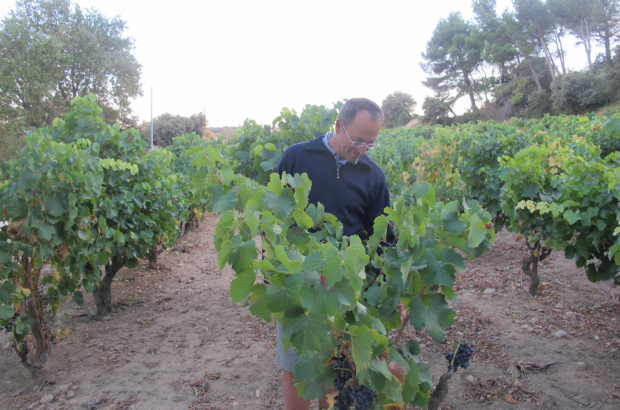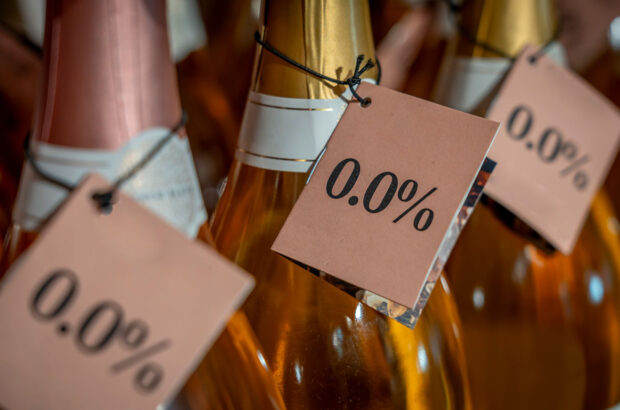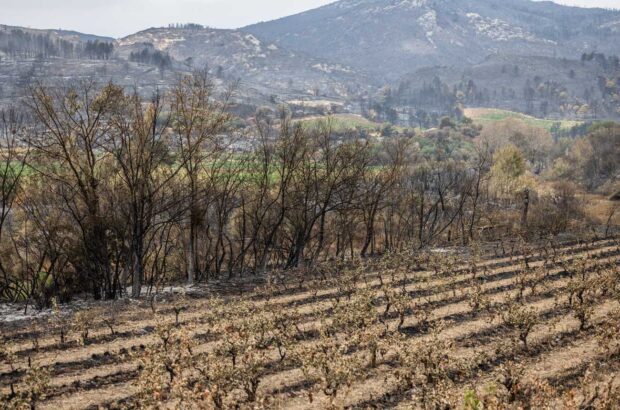Tannins are found in grape skins, seeds and stems, as well as wood vessels such as barrels. They create a mouth-coating sensation, influence wine colour and contribute to ageing potential.
The amount and type of tannins vary based on grape variety, growing conditions and winemaking choices.
Tannins can be described by their texture and maturity, and certain grapes like Cabernet Sauvignon and Nebbiolo are naturally higher in tannins. Besides wine, they are also found in tea, coffee and dark chocolate.
What are tannins?
Tannins are a type of bitter and astringent chemical compound that belongs to a larger group called polyphenols. They occur abundantly in nature, namely in the bark of many trees and in numerous leaves, legumes and fruits, including grapes.
Tannin molecules are usually much larger than those found in other types of polyphenols, and they have a unique ability to easily combine with other molecules, especially proteins, causing them to precipitate. This is the basis of leather production, in which the structure of animal hide is changed (tanned) by using various tree barks.
What do they do?
Because tannins bind with other proteins, including those in human saliva, they create a characteristic astringent, mouth-coating sensation in the mouth.
Their primary role in nature is to make unripe fruits and seeds unpalatable, thus dissuading animals from eating them when not yet ripe. Ripening changes the structure of the tannins through polymerization – increase of their overall length due to the combination of smaller molecules – and interaction with pectins (sugar compounds whose presence increases with maturation) and anthocyanins (red colouring compounds). Different harvest dates therefore mean different tannin structure and, ultimately, different tannic structure of the final wine, provided no corrections are made in the cellar.
Where do tannins in wine come from?
In wine, they come primarily from the skin, seeds and, to a lesser extent, the stems of the grapes. During alcoholic fermentation, the juice, skins and pips (and stems if the winemaker decides to do full or partial whole-cluster fermentation) macerate together. As sugar is processed and alcohol produced, colour and tannins are released into the wine. Tannins are soluble in alcohol, but not water; the longer the skins and pips macerate during and after alcoholic fermentation the more tannic the final wine will be. This is why pre-fermentation and carbonic maceration help to add colour (from anthocyanins) and flavour compounds to wine without the simultaneous addition of tannins.
This also explains why the colour of the wine somewhat correlates with the amount of tannins. Some tannins are pigment and/or precursor of pigment release – more tannins therefore contribute to deeper colouring.
White and rosé wines are fermented by excluding or minimising the contact with grape skins and tannin levels are therefore lower than in reds. However, if a white wine is fermented with extended skin and pip contact (i.e. producing a so-called orange wine) the level of tannins – colour from yellow to amber – can be significant.
Wood vessels, if used for fermentation and/or ageing, will also contribute to the tannic content of the wine. Different types of wood (oak, acacia, chestnut, etc) have different levels of tannin that leach out into the wine; the amount naturally decreases with each use of a given vessel.
All your wine questions answered in our Learn section
How to describe tannins?
Tannins can be best described through the tactile sensations they produce – think more of mouthfeel rather than aroma or flavour. It’s important to consider both their quantity and quality; whether more or less present, tannins can be very different in structure and cause very different sensations when you taste a wine.
There are two useful groups of descriptors to define tannins – according to texture and maturity.Are the tannins soft, velvety, silky? Or coarse, grainy, chalky? These are examples of textural characteristics that mirror the sensations tannins can cause in your mouth.
Regarding maturity, do they make you think of green, crunchy, unripe fruit? Or of juicy, smooth and sweet pulp? The nature of tannins is closely linked to the grapes maturation at harvest and, therefore, will mirror the nature of the wine’s fruit profile.
Another important differentiation to make is astringency vs. bitterness. Bitterness is a taste character while astringency is, as already discussed, a textural sensation. Even though tannins are not flavour compounds, they can produce a feeling of bitterness in addition to the mouth-coating grip. This is particularly true for young red and orange wines.
What grapes have high tannins?
Some grapes are naturally higher in tannins than others. Given that tannins are predominantly in the skins and seeds of the grapes, varieties with thicker skin will generally have the potential to produce wines with higher tannins. Varieties notably high in tannins include Cabernet Sauvignon, Nebbiolo, Sangiovese, Malbec, Mourvèdre/Monastrell, Syrah/Shiraz, Tannat and Tempranillo. Thinner skinned grapes – such as Pinot Noir, Gamay, Grenache – therefore produce less tannic wines.
Still, growing conditions and winemaking choices have a crucial impact on the development and extraction of tannins and on the amount that actually goes into a wine from a given variety. This accounts for the dramatic variations in a wine from a given region, produced from the same grapes in different vintages. A cooler vintage will yield grapes with less sugar and ‘greener tannins’. Diversity within the same region can be remarkable even in the same vintage. Sites at higher altitude – where grapes are exposed to more UV radiation – or extreme wind cause the grapes to thicken their skins as a natural defence.
The latter also accounts for the different expressions of the same variety hailing from different growing regions. Take for example a Barossa Shiraz vs a Rhône Syrah. The former will likely be made with riper fruit at greater alcohol potential and the tannins will, therefore, be soft, rounded and velvety. The latter’s fruit, hailing from the cooler banks of the Rhône, will not be as ripe and the tannins not as developed, for a grainier and more angular mouthfeel.
In terms of winemaking, decisions such as fermentation temperature, length of maceration (how long the juice stays in contact with the grapes’ skins), number and vigour of punch-downs or even the type of yeasts used will have an impact on the amount of tannins that are extracted from the grapes and leached into the wine.
Do tannins influence wine ageing?
There are a number of ways in which tannins impact on the way a wine evolves – not necessarily in a positive way.
The amount of wood tannins leached into the wine will increase the longer the liquid remains inside the wood vessel. Finding the sweet spot, at which the ideal wood influence has been achieved, is a complex – and extremely subjective – winemaking decision.
On the other hand, the evolution of the tannins (either from the grapes themselves or the wood) will change the structural and textural properties of the wine as it ages. Both the nature and amount of tannins will change naturally as the molecules polymerise and eventually precipitate as sediment. Once polymerised and precipitated the tannins will no longer impart any bitterness or astringency effect, while also removing some of the wine’s colour.
Nevertheless, as key structural components, the presence of tannins generally gives wine more longevity – the ‘grip’ caused by tannic astringency will make wines feel ‘fresher’ as the primary fruit aromas fade. The binding properties of tannins also help retain flavour and colour compounds longer.
What foods are high in tannins?
Tannins are mostly associated with red, dark rosé and skin-macerated white wines. But they are also easily found – and felt – in tea, coffee and dark chocolate. While present in many fruits, nuts, spices, and legumes, they occur in much lower concentrations and are therefore not as perceptible.
Taste an over-steeped black tea or an unripe peach, however, and you’ll have no trouble perceiving the characteristic astringency of tannins.







